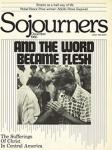This article is excerpted from an interview and article which appeared in the July, 1980 IFOR Report.
There are certain things that must be kept in mind in order to understand how in Nicaragua a dictatorship was overthrown. It was not uniquely thanks to the guerrilla struggle.
The Somoza dictatorship was one of the longest lasting in Latin America. Over a long period of time, small groups of Sandinista guerrillas had succeeded only in chipping away at the government, but they never moved it, and they never defeated it. Then certain elements appeared in the Nicaraguan situation which became the essential points that provoked the fall of Somoza's government.
The first point was the death of the journalist Chamoro, which provoked a popular reaction in all sectors. There were strikes and general work stoppages. It was an intuitive nonviolent struggle of the people, and it provoked international solidarity.
The second critical point was the death, widely seen on television, of the North American journalist. This provoked an international isolation of the Somoza government.
A third fundamental point was that Somoza traveled to the United States at about that time to ask for guarantees of military and economic support from Carter's government, and when he returned to Nicaragua, he complained that his best friend had abandoned him. In Nicaragua, popular resistance followed, with work stoppages, hunger strikes and a general mobilization. The Sandinistas used this situation to go on securing positions....
We know that when one explodes a bomb it makes a lot of noise and destroys a lot of things. This is what the daily papers, magazines, and television want to publish. Very little is said, for example, about the nonviolent land struggle of the peasants in the northeast of Brazil. Very little is said about the nonviolent struggle in Bolivia through which the people brought down a dictatorship that not even Che Guevara and his guerrillas could overthrow....
In the last decade, our continent has suffered a strong escalation of violence though guerrilla groups and through the strengthening of military regimes who have usurped political power. There has been a grave sequence of assassinations, kidnappings, torturings, and repression. These crimes, produced by both parties, are well-known.
Violence is based on the power of arms transforming the person from subject to object and placing ideologies and economic and political interests before human beings. But when one forgets the human person, one forgets God and loses the sense of life itself. Seeking to attain one's objective at any price generates an uncontrollable spiral of violence, in which "peace" is based on the terror of weapons.
Politics and economics are drained of their ethical content. Wealth is used not to better the lives of peoples, but to subjugate and oppress them. One has only to open any newspaper to verify these facts. And this is the situation in which we live every day on our continent.
To speak of nonviolence when faced with this apocalyptic situation may seem absurd--idealism out of touch with reality. It may seem an ineffective means of struggle in light of the magnitude of the problems and challenges of our time.
Yet the word of God is clear and simple: "Thou shalt not kill." And this is addressed to all people, without exception--even to governments.
Nonviolent action in Latin America is strongly inspired by the power of the gospel. The weapon of the poor is the power of active nonviolence, resisting and transforming the structures of injustice in which they live. The intention of nonviolence is to redeem the human person in the history of peoples; it is a process full of pain, struggle, and suffering, of enduring prison, death, and torture, but also full of hope and the strength of a truth which strives to find new alternatives for making a more just and fraternal society from a perspective of faith.
Grassroots communities strongly developing within the Catholic church are the leaven for many new nonviolent efforts. Guided by faith, they are seeking to find new alternatives and possible paths.
We cannot translate nonviolence into simply a method of struggle. It is a way of understanding life, the lives of human beings and of society. There is a long way to go. It is necessary to find political alternatives starting from the reality experienced in each country in Latin America.
Nonviolence in Latin America cannot be judged only by its victories. We are in a long struggle for the total liberation of the human person from a perspective of faith. It is difficult, harsh, full of uncertainty, pain, and blood, but also full of the hope of a people brought to its feet, full of courage.
The gospel is plain and simple. We must live it with all our life, notwithstanding our smallness, fears, and limitations. The Lord has announced to us: "In the world you will have tribulation; but be of good cheer, I have overcome the world." And: "If the seed does not die, it will not bring forth fruit."
It is for Christians to embrace the "madness of the cross," as Paul teaches us, and to say with him: "It is not me, but Christ who works in me." This is the challenge accepted and assumed from day to day by many brothers and sisters on our continent. The small ones, the poor, peasants, workers, students, and those in religious orders--they know anguish and hope in their own lives, and they are traveling the path to build the kingdom.

Got something to say about what you're reading? We value your feedback!
